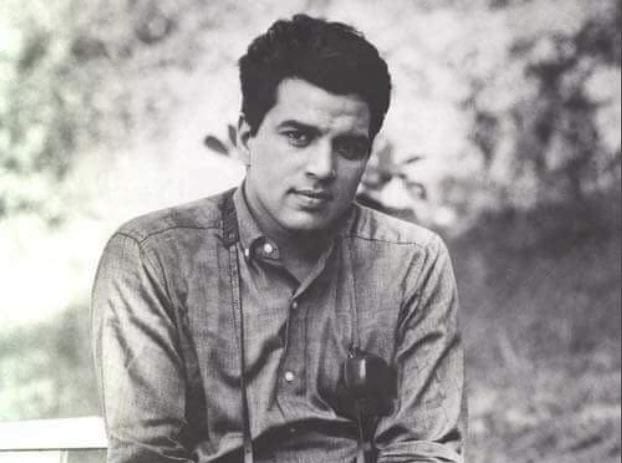
Dharmendra: An action star and a soft-hearted gentleman

He is ‘He-Man’ for action lovers and ‘Garam Dharam’ for women who couldn’t help but swoon over his butch and dishy persona. Hindi film actor Dharmendra, who turns 84 on Sunday (December 8) is, however, beyond just good looks and machismo and probably one of the most underrated actors in Indian cinema.
For the actor, his career began in the early 60s and was consistent well into the mid-80s, with his raw masculinity complemented by action roles, even as he often rose above the mould of his image.
Dharmendra debuted in the industry in Dil Bhi Tera Hum Bhi Tere in 1960 at a time when several newbies were beginning to make a mark with their own distinct styles — Shammi Kapoor in his Junglee avatar, Rajesh Khanna redefining the romantic hero and Shashi Kapoor with an unassuming and effortless charm.
Dharmendra probably found himself lost amid them — after all, some of them were actors who had inherited acting as heirloom. Filmmaker Bimal Roy cast him in one of his best films, Bandini (1963), as a doctor who falls in love with a prisoner Kalyani, played by the towering Nutan. Not that he could upstage Nutan or the other giant Ashok Kumar, whose roles comprised the larger portion of the movie. Yet, he left a mark that made him the best choice for the softer or the silent hero.
Also read | Pati, Patni Aur Woh — a film that mirrored today’s world, 40 years ago
Roy’s protégé, editor and filmmaker Hrishikesh Mukherjee, made him the brooding and philosophical Ashok in the 1966 classic Anupama. A woman-centric plot, it was about a strained father-daughter relationship — as a result of a tragic death of the mother during childbirth. With an effortless vulnerability and sensitivity, he takes the reclusive Uma (Sharmila Tagore) through her travails, as a daughter trying to step out of her overbearing father’s shadows, and helps her discover her identity and find a voice.
The tenderness he displayed found a befitting voice in Hemant Kumar with Ya Dil Ki Suno Duniya Walon indirectly communicating the pain of Uma and his as a witness to it.
Mukherjee wrote some of his most soft roles for Dharmendra. He chose the latter over Sanjeev Kumar, who played a supporting role in Satyakam. As an upright and honest Satyapriya, Dharmendra essayed the role of his lifetime in the movie set in the era immediately after India’s Independence. Convincing as a man who refuses to compromise on his ideals for anything — neither for making a fortune nor for the financial security of his family after his death, he displays a remarkable courage to own the child born out of rape and also inspires the boy to carry forward the ideals. Satyapriya, however, had his share of limitations. Idealist and a lone warrior of truth, he is unable to have a conjugal relationship with the woman who was violated, in what may have been a retribution for his crime — though unintentional — of failing to protect her from predators. Dharmendra essayed the most complex and loftiest of heroes, throwing at the audience the discomforting truth, which he is comfortable with. Satyakam had a disappointing run at the box office, but gave Hindi cinema a work that seems more relevant even today, in the age of post-truth.
Playing himself in Mukherjee’s Guddi (1970), the filmmaker tapped his comical quotient in his tale of a film-obsessed teenager (played by Jaya Bhaduri) who falls in love with the actor.
Also read | With Kishore Kumar, we happily yodelled ever after
Guddi delved into the not-so glamourous side of the industry, in a rare tribute to the faceless humans that run the industry. Like most Mukherjee’s pure comedies, Guddi approached heavy subjects with a light heart. Dharmendra is in his snug skin, natural and nonchalant, especially when he opens up to Naveen (Samit Bhanja) on how he still feels like an outsider when he says: “Mujhe kabhi kabhi lagta hain mein yahaan ka nahin hoon (Sometimes, I feel like I don’t belong here).” Discussing his sadness after witnessing the rapid fall and change in the industry, he couldn’t have been more persuasive about actors and their insecurities even as they revel in limelight.
Chupke Chupke, another classic from Mukherjee, found him hogging more space and time. As the chaste-Hindi speaking botany professor (Parimal Tripathi) masquerading as a driver (Pyarelal Allahabadi) to impress his wife (Sharmila Tagore), he left audiences in splits, troubling her jijaji (brother-in-law played by Om Prakash) with his antics. One-liners like “Is desh mein namak khaane ko nahi milti, chidakne ke liye kahan milegi (In this country, there is no salt to taste, how can one find it to sprinkle?)” and his exchanges with Om Prakash keep the spotlight on him, while he shares space with big names like Amitabh Bachchan, Jaya Bhaduri and Asrani.
An extension of the plot, albeit in a Basu Chatterjee saga and as a Sanskrit professor teaching at a women’s college, Dillagi (1978) saw him wooing his future wife Hema Malini, who plays a tough cookie and a strict Chemistry lecturer Phoolrenu, who is nicknamed ‘carbon dioxide’ by students. Swarn Kamal (Dharmendra) is her persistent suitor, after all the efforts that boomerang.
Also read | In life and death, Guru Dutt remains an enigma
In a career spanning 250-odd films and with almost a fifth of them being hits, Dharmendra has traversed several genres from drama, romance, action to comedy with ease, making him one of the most prolific actors. Even as he continued to enjoy success after superstar Rajesh Khanna ended his success streak and much after Shammi Kapoor’s yahoo days, the actor who is still celebrated only for his muscular roles in Mera Gaon Mera Desh, Sholay, Dharam Veer is yet to receive his due as a versatile actor.

